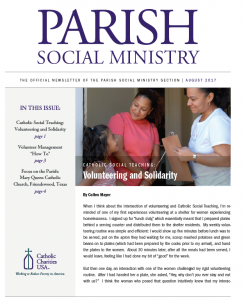CATHOLIC SOCIAL TEACHING: Volunteering and Solidarity

By Collen Mayer
When I think about the intersection of volunteering and Catholic Social Teaching, I’m re-minded of one of my first experiences volunteering at a shelter for women experiencing homelessness. I signed up for “lunch duty,” which essentially meant that I prepared plates behind a serving counter and distributed them to the shelter residents. My weekly volunteering routine was simple and efficient: I would show up five minutes before lunch was to be served, put on the apron they had waiting for me, scoop mashed potatoes and green beans on to plates (which had been prepared by the cooks prior to my arrival), and hand the plates to the women. About 30 minutes later, after all the meals had been served, I would leave, feeling like I had done my bit of “good” for the week.
But then one day, an interaction with one of the women challenged my rigid volunteering routine. After I had handed her a plate, she asked, “Hey, why don’t you ever stay and eat with us?” I think the woman who posed that question intuitively knew that my interaction with her and the other women guests had become somewhat “transactional” rather than relational: I saw my job as one of handing out plates of food rather than forming mutual relationships with the residents there.
With that simple question, she was challenging me to come out from behind the serving counter, and to embrace a key principle of Catholic Social Teaching: solidarity. Solidarity is the conviction that as sons and daughters of God, we are all “one human family” and that our identity as God’s children transcends “our national, racial, ethnic, economic, and ideological differences” (USCCB, 7 Principles of Catholic Social Teaching). The Catholic Bishops insist that a bold shift in our Church and in our communities must take place in order for us all to truly embrace a culture of solidarity:
We have to move from our devotion to independence, through an understanding of interdependence, to a commitment to human solidarity. That challenge must find its realization in the kind of community we build among us. Love implies concern for all – especially the poor – and a continued search for those social and economic structures that permit everyone to share in a community that is a part of a redeemed creation (Rom 8:21-23). (Economic Justice for All, 365).
As we create volunteer opportunities in our parishes and communities, Catholic Social Teaching asks us to create opportunities for mutuality, for both volunteers and the poor and vulnerable among us to truly encounter each other, so all are transformed and healed by the interaction. Those we meet at shelters, house builds, nursing homes, and soup kitchens are looking for much more from us as volunteers than just our ability to sort clothes, hammer nails, and scoop green beans. They are longing for genuine relationship and true encounter, which upholds their dignity as well as our own.
The principal of solidarity suggests we should avoid, as much as possible, crafting volunteer projects which put a barrier between the volunteer and those persons whom they have come to help, or experiences which create an artificial hierarchy between the “helper” and those “being helped.” Catholic Social Teaching reminds us that as brothers and sisters in Christ, as sons and daughters of God, we all have equal, infinite dignity, and at the same time, that we are all in need of healing and conversion, regardless of our national, racial, ethnic, economic, and ideological background.
For me, coming out from behind the serving counter to have lunch with the women at the shelter felt risky and uncomfortable. I knew that I was opening myself up to stories of suffering and hurt, and to people who had lived very different lives than I had. But in a seeming “reversal of roles,” the women sensed my discomfort and, instead of pushing me away, they responded with hospitality. They invited me to eat with them. By warmly welcoming me to the table, they included me in their community. This experience, as most experiences of solidarity are, was transformative and healing to me, and no doubt prepared me to be more authentic and open in the work I do now at Catholic Charities.
Collen Mayer is Social Services Department Director for Catholic Charities of Tennessee.
From Parish Social Ministry, August 2017, Reprinted with Permission.
Also reprinted with permission of author.
Click link here for the complete publication -August 2017 Issue of Parish Social Justice Ministry